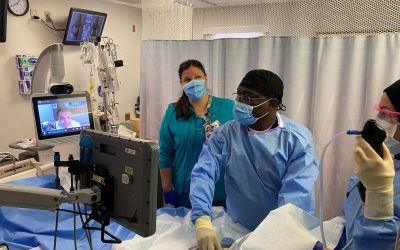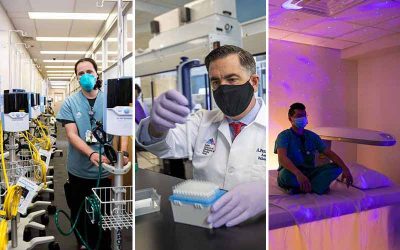Racing to Stop a Pandemic: The Critical Role of Clinical Trials
When the COVID-19 pandemic ramped up in New York City in March 2020, the disease was so novel there was no approved treatment for it. “We saw people come to the hospital with COVID-19, and without specialized treatments, many died,” said Sean Liu, MD, PhD, Associate...
From Personal Tragedy to Life Purpose: How One Masters Student at Mount Sinai Was Inspired to Focus on a Career in Public Health
Brianna Sukhdeo is a second year Master of Public Health (MPH) student in the Health Promotion and Disease Prevention concentration. She is also the first student from the Icahn School of Medicine at Mount Sinai to be selected as an ambassador as part of a special...
The Virtual Doctor in the Room: How Tele-Trach Evolved as a Catalyst for Safety and Quality
It’s been five years since the COVID-19 pandemic’s first cases, and much has changed in the world of medicine. Virtual care, also known as telehealth, became routine, among other virtual adaptations such as iPad hook-ups to IV poles to connect families to say goodbye,...
A Look Back at the Pandemic, and Views on the Future
In early 2020, Mount Sinai treated the first COVID-19 patient. Shortly after that, New York State declared a state of emergency, and COVID-19 cases started to rise. Mount Sinai staff are coming together to share their experiences of overcoming the pandemic in a look...
Mount Sinai COVID-19 Innovations: Improving Care After the Pandemic
Before COVID-19 was even formally recognized as a pandemic, David L. Reich, MD, President of The Mount Sinai Hospital, was hearing from his anesthesiologist peers in Europe about a terribly problematic “respiratory disease” with a high mortality rate.“This trusted...
Five Years Post-Pandemic: Here’s What We’ve Learned About Long COVID
The year 2025 marks five years since the COVID-19 pandemic went global. Among the many who contracted COVID-19 and recovered from the acute infection, some feel as though the disease has changed their day-to-day health for the worse. Many report a “brain fog” in which...






